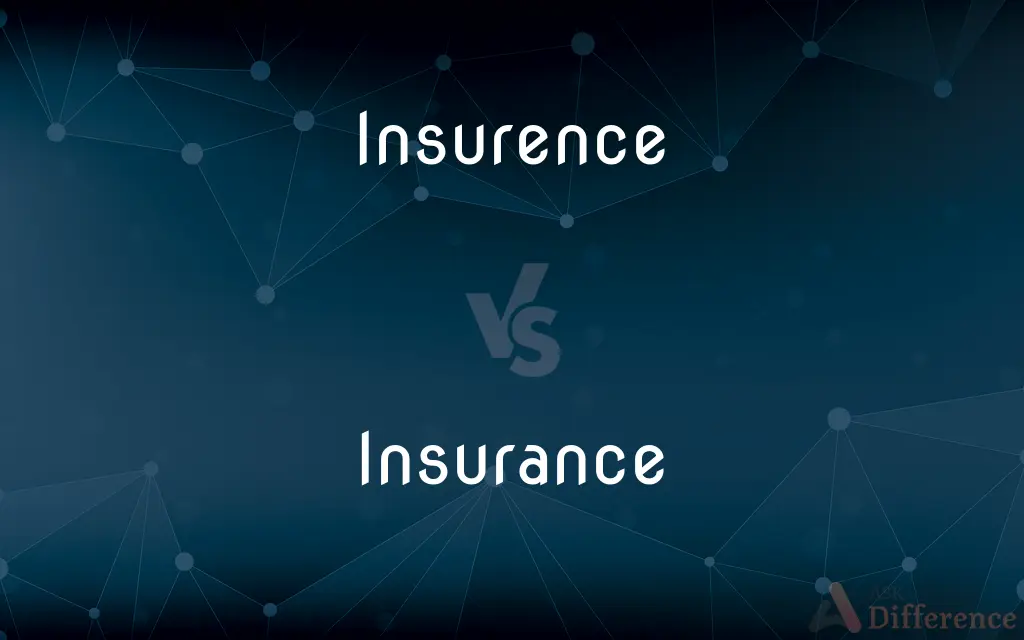Insurence vs. Insurance — Which is Correct Spelling?
Edited by Tayyaba Rehman — By Fiza Rafique — Updated on April 2, 2024
"Insurence" is an incorrect spelling, while "Insurance" is the correct spelling. Insurance refers to a policy that provides protection against financial loss.

Table of Contents
Which is correct: Insurence or Insurance
How to spell Insurance?

Insurence
Incorrect Spelling

Insurance
Correct Spelling
ADVERTISEMENT
Key Differences
Remember "Insurance" has "ance" at the end, similar to "assistance" or "distance."
Visualize an "Insurance" policy to remember the "ance" ending.
Think of "sure" in the middle, emphasizing that it's about being sure against risks.
Associate "Insurance" with security and assurance.
Note the root "insure" and add "ance" for the noun form.
ADVERTISEMENT
How Do You Spell Insurance Correctly?
Incorrect: The company offers life insurence policies.
Correct: The company offers life insurance policies.
Incorrect: Travel insurence can save a lot of hassle on trips.
Correct: Travel insurance can save a lot of hassle on trips.
Incorrect: Health insurence is a necessity for everyone.
Correct: Health insurance is a necessity for everyone.
Incorrect: He filed a claim with his home insurence provider.
Correct: He filed a claim with his home insurance provider.
Incorrect: She bought car insurence for her new vehicle.
Correct: She bought car insurance for her new vehicle.
Insurance Definitions
Insurance is a contract providing compensation for specific losses or damages.
He bought car insurance for his new vehicle.
Insurance offers protection against financial risks or potential future losses.
Life insurance provides a safety net for families.
Insurance entails a system of protection against monetary loss.
Health insurance covers medical expenses.
Insurance signifies a practice or arrangement for payment in case of damage or loss.
Travel insurance covers unforeseen events during trips.
The act, business, or system of insuring.
The state of being insured.
A means of being insured.
An arrangement or agreement that protects someone from incurring future losses, as from damage, theft, illness, or death, especially a contract that transfers the risk of a specified loss to another party in exchange for the payment of a premium.
The sum or rate for which such a contract insures something.
The periodic premium paid for this coverage.
A protective measure
Biking helmets that provide insurance against a head injury.
Being a point or score that increases one competitor's lead enough to prevent the opponent from achieving a tie with one more score
An insurance run.
A means of indemnity against a future occurrence of an uncertain event.
The car was totalled, but fortunately I had insurance.
The business of providing insurance.
After five years in banking, I switched to insurance.
(figurative) Any attempt to forestall an unfavorable event.
The sky was clear, but I took my umbrella for insurance.
(blackjack) A bet made after the deal, which pays off if the dealer has blackjack.
I only take insurance if the count is right.
(countable) An insurance policy
The premium paid for insuring property or life.
The sum for which life or property is insured.
A guaranty, security, or pledge; assurance.
The most acceptable insurance of the divine protection.
Any means of assuring against loss; a precaution; as, we always use our seat belts as insurance against injury.
Promise of reimbursement in the case of loss; paid to people or companies so concerned about hazards that they have made prepayments to an insurance company
Written contract or certificate of insurance;
You should have read the small print on your policy
Protection against future loss
Insurance represents a policyholder's hedging against financial loss from certain events.
Flood insurance is essential in certain areas.
Insurance Meaning in a Sentence
Life insurance provides financial security for your family after you're gone.
Many employers offer health insurance as a part of their benefits package.
Auto insurance is required by law in most states.
Renters insurance can cover the cost of stolen or damaged property.
Disability insurance provides income if you're unable to work due to illness or injury.
Homeowners insurance covers damages to your home and possessions inside.
Liability insurance is important for protecting your assets in case of lawsuits.
Having insurance gives you peace of mind in case of emergencies.
Dental insurance can significantly reduce the cost of dental care.
Travel insurance is essential for covering unexpected medical expenses abroad.
Business insurance protects against financial losses due to disruptions.
Without insurance, a medical emergency can lead to significant debt.
Marine insurance covers the loss or damage of ships, cargo, and terminals.
Pet insurance can help cover the cost of veterinary bills.
Flood insurance is a must in areas prone to flooding.
Vision insurance covers eye exams and glasses or contact lenses.
Umbrella insurance provides extra coverage beyond your standard policies.
Group insurance plans are often more affordable than individual policies.
Health insurance plans vary widely in what they cover and cost.
Mortgage insurance may be required if your down payment is less than 20%.
Many credit cards offer rental car insurance as a benefit.
Long-term care insurance covers care not typically covered by health insurance.
Critical illness insurance gives a lump sum payment if you're diagnosed with a serious illness.
Title insurance protects against problems with the legal status of your home.
Cyber insurance is becoming essential for businesses to protect against online risks.
Insurance Idioms & Phrases
Insurance policy
A contract that outlines the terms and conditions of the protection provided by the insurance company.
Before signing up, it's important to carefully read your insurance policy.
Common Curiosities
What is the root word of Insurance?
The root word is "insure."
Which vowel is used before Insurance?
The vowel "a" is used in the ending of "Insurance."
Which conjunction is used with Insurance?
Any conjunction can be used with "Insurance" depending on the sentence, such as "and" or "but."
What is the plural form of Insurance?
It remains "insurance" but can refer to multiple "insurance policies."
What is the pronunciation of Insurance?
Insurance is pronounced as /ɪnˈʃʊr.əns/.
Which article is used with Insurance?
Both "a" and "the" can be used with "Insurance."
What is the verb form of Insurance?
The verb form is "insure."
What is the singular form of Insurance?
The singular form is "insurance."
Is Insurance an abstract noun?
Yes, "Insurance" is an abstract noun as it represents a concept.
Why is it called Insurance?
The term "Insurance" comes from the word "ensure," signifying to make sure or secure against loss.
Which preposition is used with Insurance?
Common prepositions with "Insurance" include "for" and "against."
Is Insurance a negative or positive word?
"Insurance" is neutral, representing a concept of protection.
Is the word Insurance imperative?
No, "Insurance" is not imperative.
Is Insurance a vowel or consonant?
"Insurance" is a word and contains both vowels and consonants.
Is Insurance a collective noun?
No, Insurance is not a collective noun.
How do we divide Insurance into syllables?
In-sur-ance.
What part of speech is Insurance?
Insurance is a noun.
Is the Insurance term a metaphor?
Not inherently, but it can be used metaphorically in some contexts.
Which determiner is used with Insurance?
Common determiners like "this," "that," "my," "our," can be used with "Insurance."
Is Insurance a noun or adjective?
"Insurance" is primarily a noun.
Is the word Insurance a Gerund?
No, "Insuring" would be the gerund form of the verb "insure."
Is the word “Insurance” a Direct object or an Indirect object?
"Insurance" can function as a direct object, depending on its placement in a sentence.
What is a stressed syllable in Insurance?
The second syllable, "sur," is stressed in "Insurance."
What is another term for Insurance?
Another term for Insurance is "coverage."
What is the first form of Insurance?
As a noun, "Insurance" doesn't have verb forms. The verb "insure" has "insure" as its base form.
Is Insurance a countable noun?
No, but you can count "insurance policies."
How many syllables are in Insurance?
There are three syllables in "Insurance."
What is the opposite of Insurance?
There isn't a direct opposite, but "risk" or "exposure" contrasts with the protective nature of insurance.
Is Insurance an adverb?
No, Insurance is not an adverb.
What is the second form of Insurance?
For the verb "insure," the second form is "insured."
What is the third form of Insurance?
For the verb "insure," the third form is also "insured."
How is Insurance used in a sentence?
"She purchased insurance to protect her home against natural disasters."
Share Your Discovery

Previous Comparison
Aeriate vs. Aerate
Next Comparison
Quited vs. QuitAuthor Spotlight
Written by
Fiza RafiqueFiza Rafique is a skilled content writer at AskDifference.com, where she meticulously refines and enhances written pieces. Drawing from her vast editorial expertise, Fiza ensures clarity, accuracy, and precision in every article. Passionate about language, she continually seeks to elevate the quality of content for readers worldwide.
Edited by
Tayyaba RehmanTayyaba Rehman is a distinguished writer, currently serving as a primary contributor to askdifference.com. As a researcher in semantics and etymology, Tayyaba's passion for the complexity of languages and their distinctions has found a perfect home on the platform. Tayyaba delves into the intricacies of language, distinguishing between commonly confused words and phrases, thereby providing clarity for readers worldwide.







































